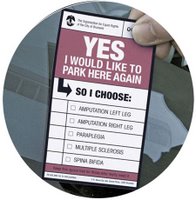 [Visual description: a retro-style poster with a bright green background, white stylized wheelchair with footprints leading away from it and a knife stuck into the adjacent surface. The slogan "Just don't tell him what he can't do" is in the upper right; the title "Terry O'Quinn is Locke" is in the lower right; the words "A deceitful father/a fateful accident/a mysterious island/a dangerous obsession/a powerful purpose/a terrible sacrifice/and/a suitcase full of knives" are in a box in the lower left.]
[Visual description: a retro-style poster with a bright green background, white stylized wheelchair with footprints leading away from it and a knife stuck into the adjacent surface. The slogan "Just don't tell him what he can't do" is in the upper right; the title "Terry O'Quinn is Locke" is in the lower right; the words "A deceitful father/a fateful accident/a mysterious island/a dangerous obsession/a powerful purpose/a terrible sacrifice/and/a suitcase full of knives" are in a box in the lower left.]Heard about this poster this morning. The television show LOST has an eighteen-hour final season starting in January, so to keep fan interest stoked, ABC has returned to the show's elaborate online publicity/ARG universe with a series of sixteen commissioned posters. This one, by designer Olly Moss, is apparently already sold out (it was a small run of 300 original screenprints).
Interesting that the illustrator chose an empty wheelchair to represent Locke. The character Locke has only been seen using a wheelchair in two or three episodes, over five seasons. According to his backstory, he used a wheelchair for four years, after a dramatic fall injured his spine; his ability to walk is miraculously restored in the plane crash that starts the show's story. Only a few of the other characters know he ever used a wheelchair, and it's not a very frequent topic of dialogue. Locke has a wide array of experiences and traits that get more screentime, but it seems he's still "the former wheelchair user" above all, maybe because disability can be just that overwhelming an element of identity sometimes.
That said, I do kinda like the retro look of this poster. It presents Locke as an edgy Steve McQueen-ish film hero, with "a suitcase full of knives"--and the wheelchair as part of his "dangerous" and "mysterious" complicated backstory--well, at least it's not pitiful.







